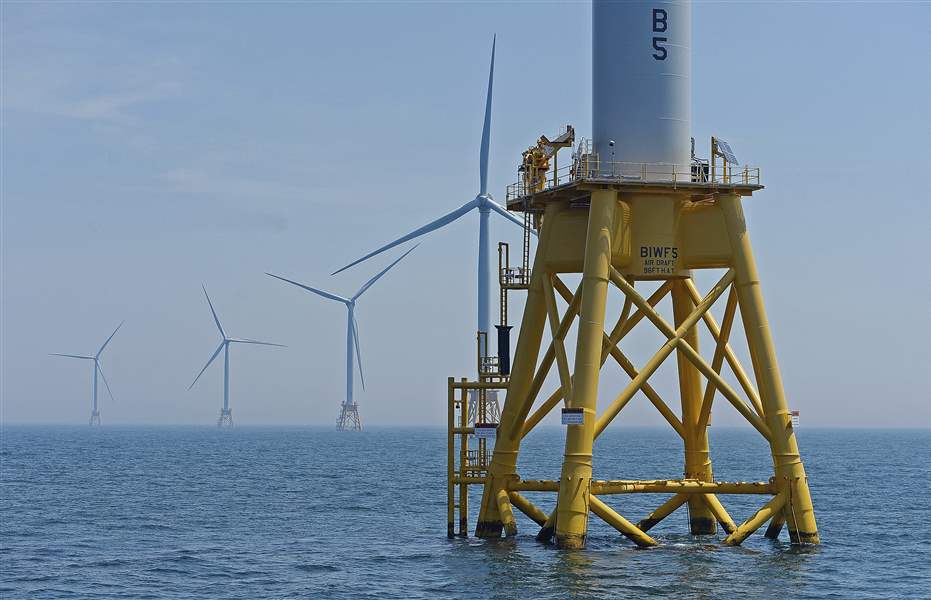
OUTDOORS
Green energy or bird choppers? Lake Erie wind farm needs closer look
7/9/2018
These wind turbines are located off the coast of Rhode Island in the Atlantic Ocean, near Block Island. The wind farm proposed for Lake Erie will have six turbines initially, connected to the mainland by an 11.8 mile long transmission line.
ASSOCIATED PRESS
CLEVELAND — There is a “green” issue boiling in the waters off this large city on the shore of Lake Erie, and this time it does not involve algae.

It is a long-running skirmish among groups with a seemingly common conservation-rooted agenda, but markedly disparate priorities when it comes to the placement of electricity-generating wind turbines. The debate has grown from a clash of conflicting data sets to what is now pushing toward a feather-strewn philosophical slugfest.
On one side we have the wind energy movement, which has been given considerable lift by political forces, intense lobbying, and its ability to slurp up federal grants and tax money along the way. Many of the wind energy projects also have been championed by big labor, seduced by the sirens’ song of jobs, jobs, jobs.
At odds with some of the wind farm projects we have found adjacent landowners concerned about the potential loss of property values, the constant companionship of that non-Gregorian hum created by the huge blades, and the lack of information on the long-term health risks, if any, associated with living near a 500-foot-tall twirling Goliath of an erector set.
There is also some serious trepidation expressed by avian experts, who fear that these gargantuan towers will too often become wolves in sheep’s clothing in their dual role as smoke-free electricity generators, and bird choppers. They accuse the wind agents of expert shopping, and crafting studies simply to create the desired outcome, while ignoring the real threat these turbines pose to anything that flies.
The Tennessee Wildlife Federation reported that in just two months, the turbines at the Backbone Mountain wind farm sliced apart 2,000 bats. PacifiCorp Energy paid a $2.5 million fine following its guilty plea to violating the federal Migratory Bird Treaty Act regarding the deaths of 38 golden eagles and 336 other protected birds at its wind farms.
While the siting of wind turbines has created legal wrangling and passionate dustups from San Diego County in Southern California all the way to Martha’s Vineyard in Massachusetts, and one such debate now rages in the agricultural expanses of northwest Ohio’s Seneca County, the issue here is the plan from Icebreaker Windpower and the Lake Erie Energy Development Corp. to place six huge wind turbines out in the lake, as a demonstration facility for wind-powered electric generation. Eventually, the entire project could involve as many as 1,400 or more wind turbines standing in Lake Erie.
The Ohio Power Siting Board’s mission is defined as one that supports “sound energy policies that provide for the installation of energy capacity and transmission infrastructure for the benefit of the Ohio citizens, promoting the state’s economic interests, and protecting the environment and land use.” In short, the OPSB makes the call on approving or rejecting wind projects.
The panel will hold a public hearing on the proposed Lake Erie wind farm project at 6 p.m. on July 19 in Cleveland City Council chambers downtown, the timing of which is puzzling for some, considering the OPSB’s technical staff has already recommended approval of the $126 million project, subject to conditions. That conditional blessing came down on the eve of the Independence Day holiday, and the timing of the recommendation does satisfy OPSB protocol.
Another hearing is set for Columbus on August 6, with the OPSB’s final decision on the project to be rendered at some point following that meeting. This notion might vary from the process flowchart the panel is following, but shouldn’t these critical public hearings take place before a formal recommendation on the project is rendered? At a previous hearing, it did not take a fire marshal to figure out that organized labor put out the call to pack the room, and most of the 150 some people present gave a rowdy “harrumph” at the mention of the construction jobs such a project would likely involve. A victory by volume and sheer numbers should not be interpreted as a clear indication of the most pressing concerns being addresses, and the issue being settled.
It is also very shake-the-head-and-wince curious that in any discussions or studies into the potential harm these giant blades might do to birds, bats, and waterfowl, the best experts right there in the neighborhood were not consulted. Black Swamp Bird Observatory, located near Oak Harbor, has as its mission the study of the birds that make their homes along the lake, and those that pass through our region on their migratory route.
BSBO also has as its research director Mark Shieldcastle, widely considered the preeminent expert on the birds of this area, and the many species that use this flyway en route to their nesting grounds in the north country from their wintering grounds in the tropics. His 32 years as a wildlife biologist who has focused his life’s work on avian research – wouldn’t that make him someone you would consult before placing six massive metal obstacles out in the lake?
Mr. Shieldcastle has many concerns related to the project, and the apparently flimsy research that has been used to possibly minimize the turbines’ impact on the lake’s frequent fliers. Since he has done extensive studies on bald eagles, cranes, terns, rails, waterfowl, shorebirds, and migrating raptors and passerines, this subject seems to be right in his wheelhouse, but the wind turbine folks have not tapped into his expertise.
“This project represents a microcosm of what the concerns are with the wind industry as a whole,” he said. “Extremely poor studies are being conducted, and the conclusions they reach are not based on sound science.”
Mr. Shieldcastle pointed out what he considers egregious flaws in some of the avian impact studies related to the project that have been done to date.
“They concluded there were no birds, but they were looking at a time when birds were not moving,” he said.
“You need to get good information in order to make informed decisions, and the consistent thing I’m seeing in all of these projects is the use of poor science in order to make conclusions you can’t support scientifically. They make it sound like it is fact, and expect everyone to accept it.”
There is also the concern over what demons from our heavy industrial past might we be awakened when the lake bottom is disturbed in order to anchor these behemoths.
This is the first Lake Erie wind turbine project that has been recommended for approval by the OPSB. They have placed some “conditions” on their approval of the project, but if those conditions are met with studies that lack transparency, or are built on flimsy science, or by cherry-picking numbers and portions of studies that push a favorable breeze on this wind farm, we all lose.
Going green is fine, but not appropriate in every circumstance or in every locale. In certain places, harnessing the wind just carries an unacceptable price tag. We need to be certain Lake Erie is not in that club.
Contact Blade outdoors editor Matt Markey at: mmarkey@theblade.com or 419-724-6068.